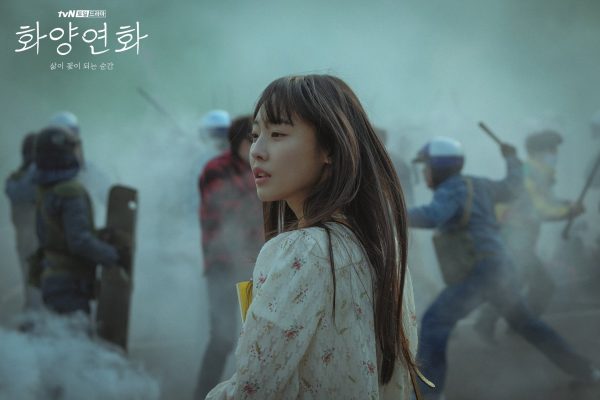Class struggle and romance in South Korea
Pete Mason, East London Socialist Party
‘When My Love Blooms’ is a typical K-drama weepy with a sharply contrasting plot line of class struggle.
“Once again we are marching on the streets for a better tomorrow”, Marxist student Han Jae-Hyun tells a rally commemorating the Korean revolution of 1987. But it is now 1993, and after six years of democracy, great hardship remains for the workers: mass sackings and evictions.
Waterboarding
“Back in the 1980s people died at the hands of the military. But we don’t know who ordered that and the truth has never been exposed, putting them down in history as angry mobs”. It was the death of a student from waterboarding that sparked the workers’ uprising in June 1987, which finally pushed the dictatorship out. A massive workplace unionisation drive took place.
Student leader Han blames “this capitalist society where only one side benefits”, and inspires the undying love of Yung Ji-Soo, who is teargassed by the riot police gathered outside the university gates. They run away together, but are mysteriously estranged.
Now, almost 20 years later, they meet again. Han has married the daughter of a chaebol (family-owned conglomerate) and has just been released from serving four years for various corporate crimes. It looks like he’ll be indicted for more corruption crimes of the chaebol. Yung has remained true to the cause.
Sacked shopworkers are protesting outside the headquarters where Han works as a corporate executive. A once sacked shopworker herself, Yung joins them and is arrested. Standing outside the headquarters is an old man with a placard condemning the company for causing his son Kwon Hyeok-su’s death.
As the plot slowly reveals the backstory of the two lovers, moving gracefully between the two periods in almost equal measure, the brutality of the corporate world today is revealed. “Five years ago,” one character testifies, “Hyungsung Steel committed [illegal] meticulous and malicious destruction of the labour union and that was an immediate cause of Kwon Hyeok-su’s death.”
Revealed is a corporate strategy of drawing in individuals within the union leadership who they can manipulate, persuading them to accept a flawed agreement, then breaking up the workplace-based union and engaging in mass sackings.
The chaebol bosses then discard the union leader they duped by spreading rumours that he is a corporate spy. Sacked, cornered, betrayed, and facing litigation, he commits suicide. It has happened twice in this chaebol. This revelation is a turning point in the plot.
Right-wing union leaders have ever been corporate fodder. But in the UK, union dupes have been made life peers rather than driven to suicide!
Which side will he choose?
The series contrasts Han’s quietly spoken father, a steelworker and union leader, who inspired him and who he takes after, and the brutal, arrogant company boss who becomes his father-in-law. The failure of the revolution to overturn capitalism, leaving the owners of the chaebols in place, and hence the corrupt political system they buy and own, is implicit from the first episode. What will Han do? Which side will he choose, now he has found his long-lost love?
Replete with K-drama tropes, beautiful music, and painstakingly slow, nevertheless this is an attractive romance with some conviction. Don’t expect a socialist solution, but the raw class divisions in Korean capitalism form the dynamics of the plot.
When My Love Blooms is currently showing on Netflix








